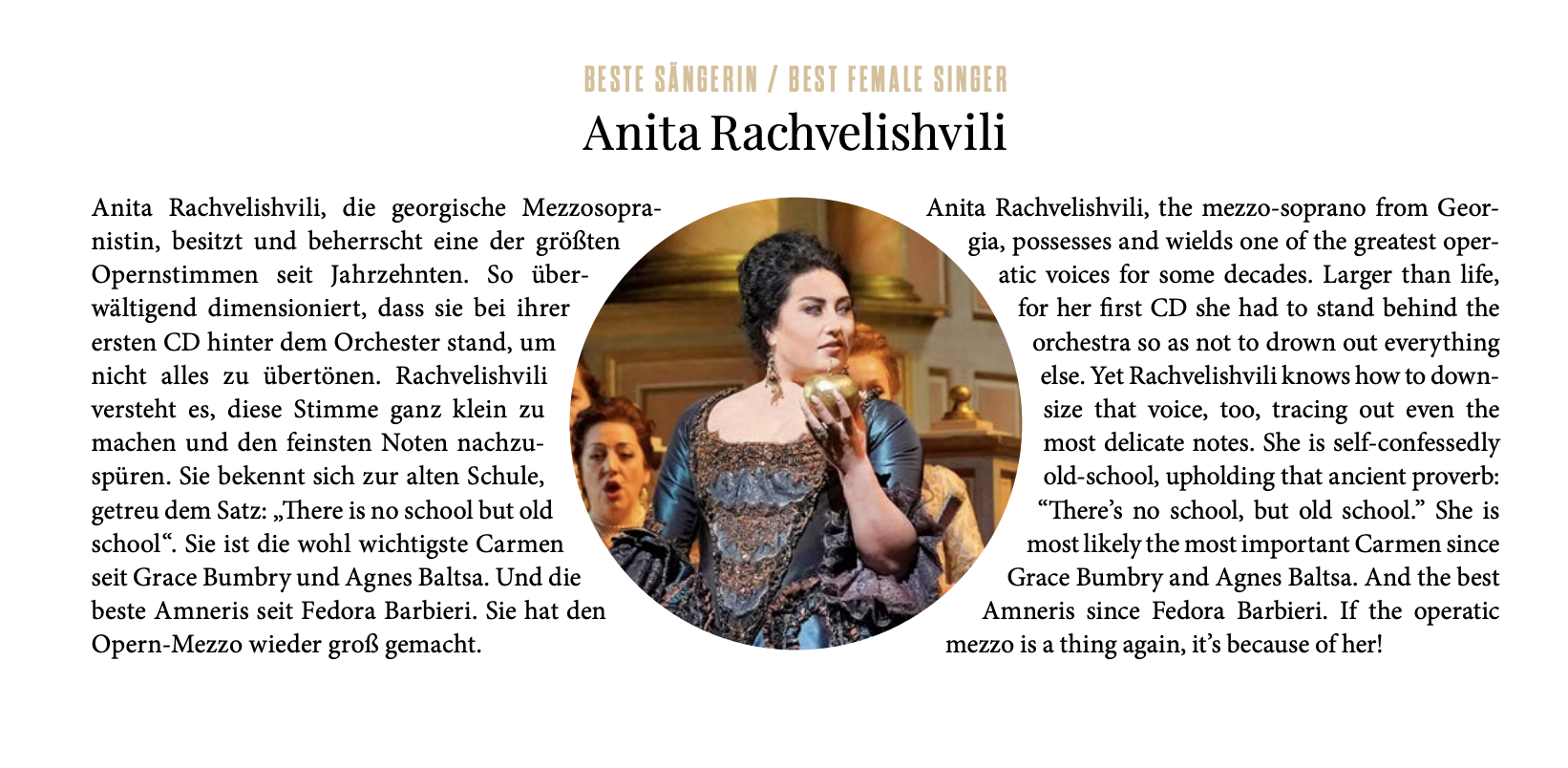Anita Rachvelishvili has been named “Best Singer” at the OPER! AWARDS 2020
“Best Singer” at the OPER! AWARDS 2020
In an interview, the mezzo-soprano talks about her Wagner plans, vocal eroticism, and permanent diets.
Interview: Kai Luehrs-Kaiser
Your rise was one of the fastest in recent years. Is your life still the same?
Certainly not. I broke off my tents in Milan and returned to Georgia three years ago. We live in an old house, this way I have more quality time with my husband now. I did want to go back. Briefly, it was not an easy time.
What did you win, what did you lose?
I won: a lot of stress, of course! You get to know many people, which I enjoy. I lost ... driving a car! Seriously: I am a passionate, fast driver. It's the reason why I feel so comfortable in Germany.
You became famous for two roles: Carmen and Amneris. A rare combination?
Today maybe. In the past, female singers often liked to combine Carmen and Amneris. Take Fiorenza Cossotto! In between she even sang Adalgisa in Norma. How was that possible? Very simple: You sang the entire repertoire with the same, own voice. That's exactly what old school means. Today we believe that each composer requires from us to use his own technique. A mistake! The old school, which I also swear by, is all about breathing, diaphragm and good support.
But there are enormous differences between Carmen and Amneris !?
Yes, because of the nonverbal aspects of the role. Carmen has to move, she has to be able to dance. As for Amneris, I just stand around and think about my next steps. Not bad either! It is certainly comfortable when as a singer you just can stand and sing. Unfortunately, that's too inactive for me. I would lose interest in the long run.
How often have you sung Carmen so far?
I can't keep up with counting. It must have been between 300 and 400 times.
Many singers in their field, for example Grace Bumbry and Christa Ludwig, had a distinctly erotic timbre. Do you need it?
Necessarily! You even need it as Azucena in Trovatore if you don't want to lose your audience. And not because I want to be the temptress at any cost, but more so because of the colors. I need flattering, warm, supple colors, no matter what role. By the way, I believe that you can't just produce an erotic voice color. It has to come from within. To be more precise: from the very bottom. Only then is she worth something.
The opposite type would be a singer like the legendary Fedora Barbieri, an extremely defensive, attacking combat mezzo.
I also serve this type a little, which I'm proud of. Barbieri had destructive resources in her voice. Really great! You need something that wasn't there before, and then the real fun begins. Fedora Barbieri was also the absolute master of the chest voice. I myself admit how much fun it is to use your voice like a weapon on stage. This is real fun. How about your fighting and conflict management skills in real life?
Good enough! We in Georgia grew up with the reality of war. Leaving the house was often life-threatening. I can easily put away a few jealousies in Verdi's works. Little gets me out of step. I am combative when I have to.
Have you learned anything for life from the opera?
I took emotions from life with me onto stage. And on stage I learned to be more patient. A person like Amneris has to pull herself together. In the meantime, I also see a self-control in myself personally. Dalila for example is also a very controlled woman. I used to be very blunt and said more than I should have said. On stage I learned how to shut up.
You were awarded “Best Singer” with the OPER! AWARD 2020. Assuming you had to award someone, who would it be?
Since I don't want to annoy any of my coworkers, maybe I would choose the option of nominating someone from the past. If so it would without a doubt the Italian Tenor Galliano Masini. He died almost 25 years ago - shortly after his 90th birthday. Masini, thoroughly forgotten, was a dramatic tenor who got as far as the Metropolitan Opera. If there was ever anyone who sang with a full heart and a full voice, it was him. He would be a role model for all of us.
In addition to Carmen, there are many Santuzzas, Ebolis, Dalilas and Azucenas in your schedule. How long can you hold out? Do you need new repertoire?
I need it. Every opera changes you, and afterwards you understand the old roles better. In Munich, probably in three years, I'll be singing Didon in Les Troyens for the first time. I tried that at the beginning of my career, it did not really work. I am sure that it still means a lot of work for me today to enter Berlioz ’world. I also have plans for Donizetti’s La Favorite.
When will Kundry, Fricka and Ortrud follow?
Soon after. Daniel Barenboim had already asked me about the Wagner roles, especially Kundry. I replied that I was too young for that. To be honest, the problem is the language - I have to learn German first, at least the basics. In five years, I guess, it will be so far. Then Kundry can come.
After all, you should be one of the few singers who need not be warned about Wagner ...
He is not dangerous to me. Rather easier than Verdi. What you need is a certain degree of maturity and confidence. In Italian, that's very clear, I could sing Wagner in Italian right now. What a shame that we no longer have this option. And yet, it is better that way. It is difficult to relearn what one has learned in another language. That is my problem with Don Carlo in the French and Italian versions. I get confused easily. How can you prevent the loud Wagner tones from fading the colors you developed in Italian opera?
With quieter Wagner tones! And by keeping my singing technique. Many singers believe that they have to become Wagnerians as a singer in order to be able to sing this composer. Lilli Lehmann kept her voice, regardless of whether she sang Wagner, Verdi or Mozart. Again: keep your technique, change your style!
Would you have an alternative to Wagner in the long run?
Not really. Thank God I don't want to avoid it.
Could you imagine becoming a soprano at some point, like Waltraud Meier did?
For Tosca I would take it in consideration, but only once! I also like to sing the aria from Turandot. The high notes are there. So is the fun.
Do you have a particular aria to sing into?
Yes! “O don fatale”, the Eboli aria from Don Carlo. It's ideal because it trains endurance and blows up in the end.
Your debut CD with Sony was a great success. When is your second recital coming?
It's almost done. With songs by Tchaikovsky, Rachmaninoff, Tosti, Duparc and de Falla. Maestro Vincenzo Scalera accompanies on the piano. It's supposed to be out next year.
On your first CD you stood behind the orchestra to keep the microphones from bursting, and this time?
Far from the microphone! And even further away from the piano. We experimented for a long time, some of the mics that we used were from the 1940-ies. Everything about my voice is a question of the right balance. Otherwise it sounds harsh.
Do you have to bury the dream of ever making a studio recording of Carmen?
I'm working on it. It's still my dream.
You come from one of the home countries of wine growing. Red or white?
Both, and neither. I can't drink any more wine at all. Almost all singers develop a fatal reflux problem after ten years at the latest. It can only be managed with a strict diet and clear restrictions. In my case: no coffee! No alcohol! No spices either. My menu with oat flakes and lots of apples is the healthiest, but also the most boring that I know. And all of these just to avoid the worst feeling of all: the voice not working properly in the morning.
You are not as robust as it might seem?
One single mistake and the bill will follow. The only luxury that I stubbornly afford is not to test my voice right away in the morning while still in bed. If I have a strange feeling in my chest, I already know that something is wrong. I insist on not making sounds immediately when I get up. Otherwise I would go crazy!
You can see them on the cover of our current issue. Maria Callas, when pictured, wanted to look like Audrey Hepburn. And you?
I would like to be thinner, that has always been my wish. I would be happy with that. I like myself for who I am.
Your husband is also your vocal coach. How is it going?
It's going very well because he's a very good teacher. My husband is a tenor. We already knew each other privately before we worked closer artistically. Most importantly, we agree on this principle: Sing as you speak and you will never be wrong! There is some continuity between singing and speaking. So why shouldn't there also be a smooth transition between work and private life?
The next appearances of Anita Rachvelishvili are in February as Carmen at the Vienna State Opera and from June as Amneris in Verona and Munich (July).
Source: www.oper-awards.com


